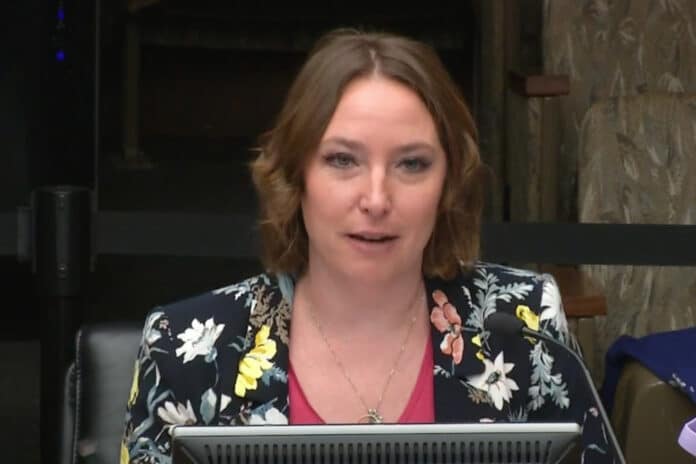
A west metro lawmaker sponsoring legislation she promises will significantly subsidize the cost of child care for “middle-class” families across Minnesota officially introduced her proposal in bill form at the Capitol this week.
While language in HF3681 includes many details surrounding the structure of the “Great Start Affordability Program” and at what income levels families might become eligible, the bill contains placeholders (as opposed to dollar values) for its bottom-line cost to taxpayers.
That’s a departure from the $500 million price tag Rep. Carlie Kotyza-Witthuhn, DFL-Eden Prairie, put on the program during a press conference she held in December to promote the legislation.
Those “blank spaces where appropriations would go” drew criticism from Rep. Walter Hudson, R-Albertville, and other Republicans during a hearing in the House Children and Families Committee on Thursday.
“The question becomes not just how much is this going to cost us now, but to what extent are we going to be able to maintain such a system moving forward?” Hudson said.
That cost has not yet been finalized, but the eligibility of those the program is targeting starts for households with one or more children under the age of five who earn more than $60,000 a year. Eligibility is capped at households that earn more than $174,000 annually. That ceiling is derived from language in the bill that states eligible households must have income less than 150 percent of the state median income. The legislation would give power to the Minnesota Department of Education to determine how much financial assistance to award households based on income. Awards would run for 12 months, and families would have to renew their application for assistance annually.
The aim of the bill, Kotyza-Witthuhn said, is to capture families who earn too much to qualify for already existing child care scholarships provided through federal and state programs to low-income families, but who increasingly are unable to afford child care expenses for infants, toddlers and preschoolers.
For well more than a decade there has been a bipartisan effort to expand early childhood learning scholarships to low-income families across Minnesota. Households of two parents and two children that earn less than $60,000 annually have access to those scholarships already.
“In Minnesota the median family with an infant is spending 21 percent of their annual income (on child care),” Kotyza-Witthuhn told her colleagues in the House Children and Families Committee. That amounts to about $16,000 per year or more than $300 per week.
“I’ve heard from people who have made their family planning decisions based on child care,” Kotyza-Witthuhn continued. “People who have dropped out of the workforce and walked away from careers they love because it just doesn’t make sense to work when child care is so expensive.”
While other lawmakers during the hearing were empathetic to the half dozen testifiers who spoke in support of the bill, Rep. Mike Wiener, R-Long Prairie, was perhaps the most understanding.
“As a father of nine, and one of my children is here with me today, I have a big investment in families and their well-being. It’s near and dear to my heart,” Wiener said.
Wiener said his constituents in central Minnesota have watched their child care resources dissolve over the last decade due to what he says have been a number of state regulations over the child care industry that have hit in-home daycares the hardest.
“We want good, safe daycares obviously, but when we are driving them out of business because of regulation that has been put into place, then we have to come up with another solution,” Wiener said. “Maybe we have to analyze if that (overregulation) has been effective and if it needs to keep going on.”
Without fiscal appropriations attached to the bill, the committee took no vote on the legislation. But chair Dave Pinto, DFL-St. Paul, said he anticipates those dollar values will be added to the bill later this session and will hold another hearing when they do.
“We know there is such a need all around the state because this is a public good, it needs public support,” Pinto said.
Hank Long
Hank Long is a journalism and communications professional whose writing career includes coverage of the Minnesota legislature, city and county governments and the commercial real estate industry. Hank received his undergraduate degree at the University of Minnesota, where he studied journalism, and his law degree at the University of St. Thomas. The Minnesota native lives in the Twin Cities with his wife and four children. His dream is to be around when the Vikings win the Super Bowl.












